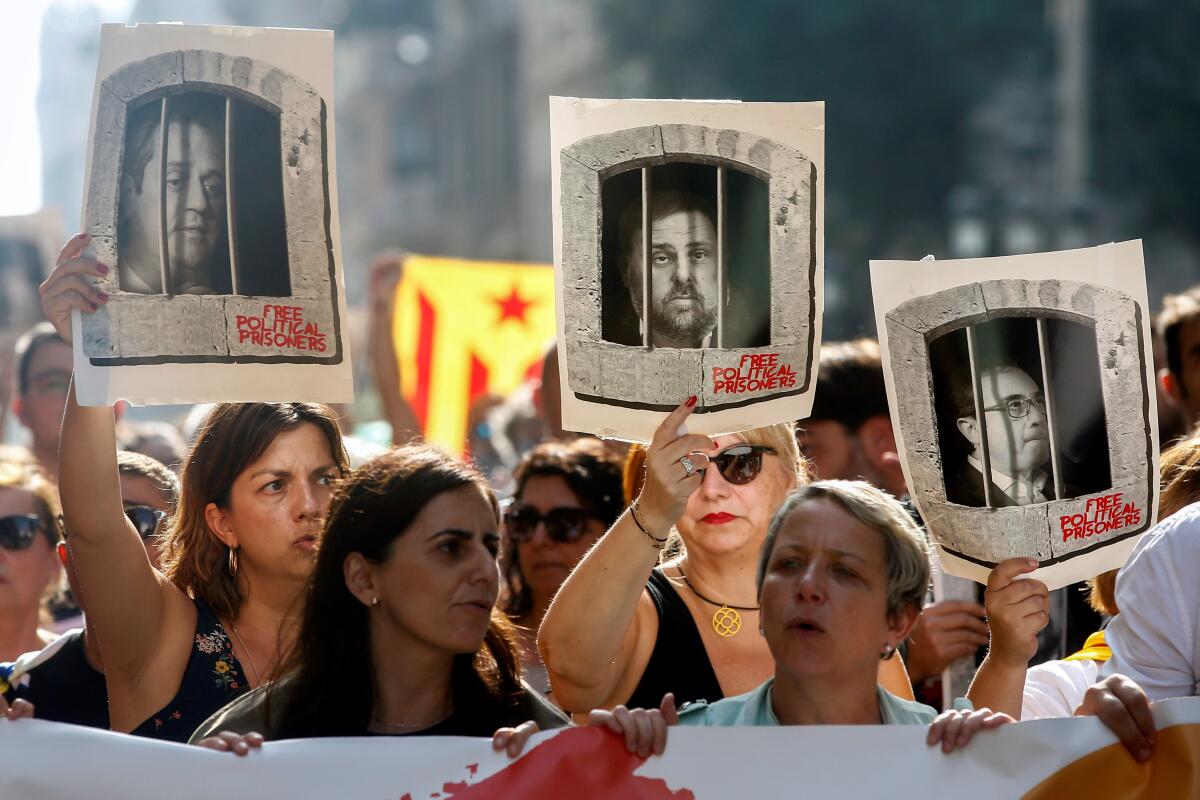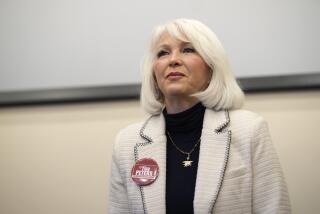Spain hits prominent Catalan separatists with lengthy prison terms; protests erupt

- Share via
MADRID — Spain’s Supreme Court on Monday sentenced 12 prominent former Catalan politicians and activists to lengthy prison terms for their roles in a 2017 bid to gain independence for Catalonia, sparking protests across the wealthy Spanish region.
The landmark ruling, after a four-month trial, inflamed independence supporters in the northeastern region bordering France where Catalan identity is a passionate issue.
Within hours, police in riot gear clashed with protesters gathering at Barcelona’s airport. Police used batons to drive back a crowd near the entrance to the subway inside the airport’s main terminal. The subway line to the airport was closed on police orders. The protests snarled traffic along airport access roads.
Nine of the Catalans on trial for their efforts to achieve independence received between nine and 13 years in prison for sedition. Four of them were additionally convicted for misuse of public funds, and three more were fined for disobedience. The Spanish Constitution says the country can’t be divided.
Spain’s caretaker prime minister, Pedro Sánchez, said he hoped the sentence would mark a watershed in the long standoff between national authorities in Madrid and separatists in the Catalan capital, Barcelona. Sánchez said the court’s verdict proved the 2017 secession attempt had become “a shipwreck.”
He urged people to “set aside extremist positions” and “embark on a new phase” for Catalonia.
Authorities will respond firmly to any attempt to break the law, Sánchez said in a live television address, as thousands of people joined protest marches. Some protesters held banners saying, “Free political prisoners.”
Spanish authorities deployed hundreds of extra police to the region in anticipation of the ruling.
“Today, they have violated all their rights. It is horrible that Europe doesn’t act,” 60-year-old civil servant Beni Saball said at a Barcelona street protest, referring to those convicted.
But retired 73-year-old bank clerk Jordi Casares said he wasn’t surprised by the verdict.
“It is fair because they went outside the law,” he said, walking out of his home on a Barcelona street. “I hope that after a few days of tumult by the separatists the situation can improve.”
Catalan regional president Quim Torra described the verdict as “an act of vengeance.”
“The Spanish state’s refusal to launch a dialogue and seek a democratic solution to the political conflict will not stop us from acting on our determination to build an independent state for our nation,” Torra said in a speech in Barcelona.
Spain’s caretaker foreign minister Josep Borrell, soon due to become the European Union’s top diplomat, urged an effort at political and social healing because the independence effort is doomed.
“There is no single constitution of Europe that provides the possibility of creating unilaterally the independence of a part of the territory,” he told the Associated Press.
In their ruling, the seven Supreme Court judges wrote that what the Catalan leaders presented as a legitimate exercise of the right to decide was in fact “bait” to mobilize citizens and place pressure on the Spanish government to grant a referendum on independence.
Although prosecutors had requested convictions for the more severe crime of rebellion, which under Spanish law implies the use of violence to subvert the constitutional order, judges convicted nine defendants of sedition, implying that they encouraged public disorder to subvert the law.
Ex-Catalan regional Vice President Oriol Junqueras was sentenced to 13 years for sedition.
He and three other former Cabinet members — Raül Romeva, Jordi Turull and Dolors Bassa, who were sentenced to 12 years — were also convicted for misuse of public funds.
The former regional parliament speaker, Carme Forcadell, was given 11½ years in prison; ex-Cabinet members Joaquim Forn and Josep Rull 10½ years each; and grassroots pro-independence activists Jordi Sánchez and Jordi Cuixart got nine years.
Three other former members of the Catalan Cabinet — Santiago Vila, Meritxell Borràs and Carles Mundó — were fined for disobedience.
All of them were barred from holding public office.
A Supreme Court judge later issued an international arrest warrant for fugitive ex-Catalan leader Carles Puigdemont, who with several others fled to Belgium in October 2017 when they were summoned to appear in court.
Judge Pablo Llarena issued the request on charges of sedition and misuse of public funds. Spain issued a first warrant in 2017 but later withdrew it after a German court ruled that Puigdemont couldn’t be extradited to Spain for rebellion, one of the initial charges.
Catalonia has powers to run its own prisons, unlike the rest of Spain’s regions. That means regional authorities can allow inmates to spend the night in prison Monday-Thursday and have the rest of the time at home. Such a step for those convicted Monday would likely invite legal challenges, however.
The trial featured more than 500 witnesses, including former Prime Minister Mariano Rajoy, and 50 nationally televised hearings.
At the center of the prosecutors’ case was the Oct. 1, 2017, independence referendum that the Catalan government held even though the country’s highest court had disallowed it.
The “Yes” vote won, but because it was an illegal ballot most voters didn’t turn out and the vote count was considered of dubious value. The Catalan Parliament, however, unilaterally declared independence three weeks later, triggering Spain’s worst political crisis in decades.
The separatist effort fell flat when it won no international recognition. The Spanish government stepped in and fired the Catalan regional government, with prosecutors later bringing charges.
Defense lawyers argued that the leaders of the secessionist movement were carrying out the will of roughly half of the 7.5 million residents of Catalonia who, opinion polls indicate, would like the region to be a separate country.
The Catalan leaders — jailed for nearly two years while their case was heard — have grown into powerful symbols for the separatists. Many sympathizers wear yellow ribbons pinned to their clothes as a sign of protest.
More to Read
Sign up for Essential California
The most important California stories and recommendations in your inbox every morning.
You may occasionally receive promotional content from the Los Angeles Times.










